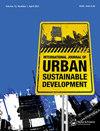权属保障与产权:印度奥里萨邦“贫民窟”居民的土地所有权案例
IF 2.4
Q3 ENVIRONMENTAL STUDIES
International Journal of Urban Sustainable Development
Pub Date : 2022-04-12
DOI:10.1080/19463138.2022.2054815
引用次数: 3
摘要
印度持续快速的城市化进程伴随着不断增长的“贫民窟”人口的不合标准的生活条件。改善贫民窟居民的生活条件仍然是一项巨大而棘手的挑战,需要基于家庭对这一过程的实际经验的大规模解决方案。印度东部的奥里萨邦目前正在实施一项全州范围的土地所有权倡议,以《2017年奥里萨邦贫民窟居民土地权法案》为基础,通过法律、制度和技术创新,改善100万贫民窟居民的土地使用权保障。鉴于授予“完全产权”的头衔的已知负面后果,例如头衔的投机性销售,促进精英捕获,以及社区生活和社交网络的破坏,OLRSD将头衔塑造为一种“有限工具”,仍然确保继承的可能性,并旨在促进住房支持贷款的抵押贷款。本文讨论了奥里萨邦在三个地区研究的九个定居点的所有权政策的“中间”方面的早期经验。根据人们对他们所经历的现实的叙述,在贫民窟改造的补充下,标题已经促进了极端贫困家庭住房条件的改善。然而,随之而来的挑战正在浮出水面,例如,尽管OLRSD正式允许将所有权用作住房贷款的抵押品,但主流银行不接受所有权迫使接受者从虚假的私人贷款人那里借款,从而增加了他们的脆弱性。了解这些挑战和相关挑战,有助于更好地解决印度各地大规模贫民窟法律上的土地保有权安全问题。本文章由计算机程序翻译,如有差异,请以英文原文为准。
Tenure security and property rights: the case of land titling for ‘slum’ dwellers in Odisha, India
ABSTRACT India continues to urbanise rapidly tinged with sub-standard living conditions of a growing ‘slum’ population. Improving the living conditions of slum-dwellers remains a gargantuan and intractable challenge requiring solutions at scale grounded on households’ real experience of the process. The State of Odisha, in Eastern India, is currently implementing a state-wide land-titling initiative to improve the tenure security of a million slum-dwellers through legal, institutional, and technical innovations based on the Odisha Land Rights to Slum-dwellersAct 2017 (OLRSD). Given the known negative consequences of titling that grants ‘full property rights’, such as the speculative sale of the titles, the facilitation of elite capture,and disruption of community life and social networks, the OLRSD has fashioned the title as a ‘limited instrument’ that still assures the possibility to inherit and aims at facilitating mortgage for housing-backed lending. The paper discusses early learnings from Odisha’s ‘intermediate’ aspects of its titling policy in nine settlements researched across three districts. As per people’s accounts of their experienced reality, the titling, complemented by slum upgrading, has already facilitated improvements in the housing conditions of households subject to extreme poverty. However, concomitant challenges are surfacing for instance, although the OLRSD formally permits the titles to be used as collateral for housing loans, the non-acceptance of the title by mainstream banks forces the recipients to borrow from spurious private lenders, thus increasing their vulnerability. Understanding such and related challenges is relevant for better addressing the dimension of de jure land tenure security in slums at scale across India.
求助全文
通过发布文献求助,成功后即可免费获取论文全文。
去求助
来源期刊

International Journal of Urban Sustainable Development
ENVIRONMENTAL STUDIES-
CiteScore
4.00
自引率
4.00%
发文量
24
期刊介绍:
International Journal of Urban Sustainable Development aims to provide a forum for cutting-edge research and rigorous debate for an in-depth and holistic understanding of the complex inter-related environmental, social, economic, political, spatial, institutional and physical challenges facing urban areas. Its premise is that multi-disciplinary approaches provide the space for the range of disciplines and perspectives related to the full breadth of issues that affect urban sustainable development.
 求助内容:
求助内容: 应助结果提醒方式:
应助结果提醒方式:


